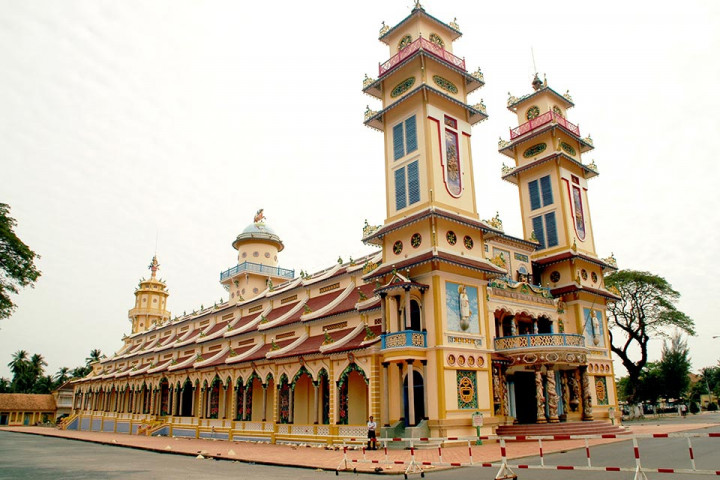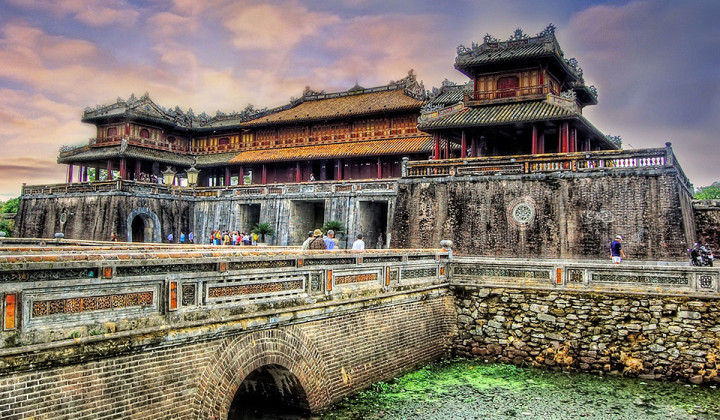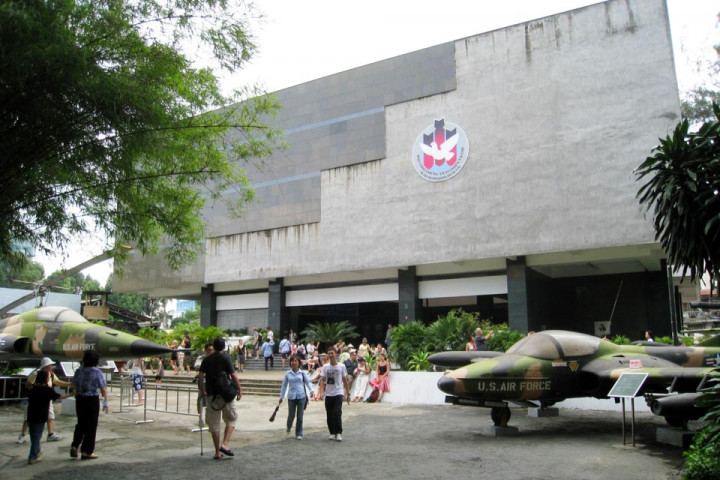Hội du lịch Việt Nam - Bài viết mới
Khuyến mãi - dự thưởng
Các chương trình khuyến mại dự thưởng nhằm quảng bá sản phẩm, website liên quan đến lĩnh vực du lịch lữ hành, khách sạn, nhà hàng...(Các ngành không liên quan vui lòng đăng ở chuyên mục RAO VẶT)
537 Bài viết
Bài mới Gửi bởi thecottage Cơ Hội Săn Deal Hot - Gi...
Giới thiệu
Chào các bạn, để mọi người hiểu nhau hơn các bạn vui lòng giới thiệu về bản thân mình tại đây. Vui lòng không spam ở đây
Chuyên mục con : Blogs
400 Bài viết
Bài mới Gửi bởi conghaidinhcuqt cho thuê xe du lịch.
Hội du lịch - Tin tức và sự kiện
Khu vực dành cho tin tức và các bình luận về du lịch. Tất cả thành viên đểu được đăng bài ở đây.
Chuyên mục con : Công nghệ và du lịch
3525 Bài viết
Bài mới Gửi bởi thecottage Re: Villa Hồ Tràm Cho D... Hôm qua lúc 03:13:38 PM
Dành cho người mới tham gia
Tập hợp các chỉ dẫn cơ bản dành cho người mới đi du lịch nên đọc.
990 Bài viết
Bài mới Gửi bởi sapamoments Re: Kinh nghiệm du lịch...
Thảo luận chung về du lịch
Các vấn đề tổng quan về du lịch, địa điểm du lịch và các vấn đề khác vui lòng đăng ở đây!
Chuyên mục con : Du lịch Hè , Du lịch Tết
1801 Bài viết
Bài mới Gửi bởi thecottage Thuê Villa Hồ Tràm Cuối ...
Du lịch và nhiếp ảnh
Nơi chia sẻ các kinh nghiệm chụp hình đẹp khi đi du lịch, nơi trao đổi chia sẻ kinh nghiệm nhiếp ảnh cho mọi người học hỏi.
4 Bài viết
Bài mới Gửi bởi lamgiang 9 QUY TẮC BỐ CỤC CỦA NHI...
Kinh nghiệm du lịch
Chia sẻ những kinh nghiệm khi đi du lịch
Quản trị: mythientran
3994 Bài viết
Bài mới Gửi bởi lamgiang Re: Kinh nghiệm du lịch... Hôm qua lúc 11:18:22 AM
Passport & Visa
Q & A about the legal stuff!!
1453 Bài viết
Bài mới Gửi bởi visavietnam.net.vn Điều kiện xin visa thăm ...
Kinh nghiệm về vật dụng mang theo
Các vấn đề về hàng hóa tư trang cần mang theo, và giá cước khi mang theo hàng hoá đi du lịch hay màng hàng về làm quà.
166 Bài viết
Bài mới Gửi bởi coolmate 7 sai lầm về hành lý xác...
Khách sạn & chỗ trọ
Cần thông tin về khách sạn nhà trọ, hãy dặt câu hỏi tại đây!
Chuyên mục con : Khách sạn được đề cử , Homestay
3467 Bài viết
Bài mới Gửi bởi thecottage Du Lịch Hè Hồ Tràm: Lý D...
Team Building
Thông tin và kỹ năng, kiến thức về team building tại Việt Nam. Mọi điều cần biết về Team Building.
106 Bài viết
Bài mới Gửi bởi VietPower2023 Team building là gì? Tổ ...
Bạn đồng hành
Tìm người đồng hành post ở đây
139 Bài viết
Bài mới Gửi bởi nlh220401 TÌM BẠN ĐỒNG HÀNH DU LỊC...
Than phiền
Các than phiền về dịch vụ du lịch, các nhà cung cấp dịch vụ, các địa điểm du lịch. Những gì ko hài lòng về du lịch bạn đăng ở đây.
306 Bài viết
Bài mới Gửi bởi tuantu Re: 7 cách phát hiện phò...
Các phương tiện du lịch
Thảo luận về các vấn đề đi lại như máy bay, xe bus, xe ôm, taxi, xích lô...
3444 Bài viết
Bài mới Gửi bởi dumien Phí hạ cánh trong ngành ...
Tiếng Anh du lịch
Trao đổi chia sẻ kinh nghiệm tiếng anh từ cơ bản đến nâng cao dành cho người đi du lịch. Các tài liệu liên quan đến tiếng anh du lịch đăng ở đây.
385 Bài viết
Bài mới Gửi bởi lamgiang Re: Từ vựng chung về đị...
Tài liệu sách báo du lịch
Nơi chia sẻ các tài liệu, sách báo về du lịch.
86 Bài viết
Bài mới Gửi bởi tiimhotel Cẩm nang du lịch nước ng...
Bản đồ du lịch Việt Nam
88 Bài viết
Bài mới Gửi bởi Green Tour DN Cẩm nang du lịch 12 thán...
Youtube Việt Nam
297 Bài viết
Bài mới Gửi bởi deho Re: 24h Du lịch LIÊN HƯ...
Miền Bắc
Các địa điểm, kinh nghiệm, và thông tin du lịch Miền Bắc, đăng ở đây
2489 Bài viết
Bài mới Gửi bởi dumien Đèo Nà Tềnh – cung đường...
Miền Trung
Các địa điểm, kinh nghiệm, và thông tin du lịch Miền Trung, đăng ở đây
Quản trị: minhnhatc5
2855 Bài viết
Bài mới Gửi bởi booktrip.me TỈNH QUẢNG BÌNH NẮM GIỮ ...
Tây Nguyên
Các địa điểm, kinh nghiệm, và thông tin du lịch Tây Nguyên, đăng ở đây
Quản trị: minhnhatc5
735 Bài viết
Bài mới Gửi bởi booktrip.me TOP 8 QUÁN CÀ PHÊ SĂN MÂ...
Miền Nam
Các địa điểm, kinh nghiệm, và thông tin du lịch Miền Nam, đăng ở đây
2407 Bài viết
Bài mới Gửi bởi thecottage Re: Thuê Biệt Thự Hồ Tr... Hôm qua lúc 03:17:14 PM
Đến đâu ăn đó!
Bạn là dân du lịch, bạn đi nhiều nơi, bạn biết nhiều chỗ ăn ngon giá cả hợp lý, bạn muốn chia sẻ với mọi người hãy đăng ở đây. Bạn muốn biết các địa điểm ăn uống khi đi du lịch hãy vào đây!
2001 Bài viết
Bài mới Gửi bởi dumien Giới thiệu các quán ăn ổ...
Du lịch Việt Nam qua ảnh
Nơi đăng hình ảnh về non nước Việt Nam, ghi lại những khoảnh khắc bạn đã đi qua trên mọi nẻo đường Việt Nam.
589 Bài viết
Bài mới Gửi bởi booktrip.me Top 7 cảnh đẹp bất ngờ t...
Vietnam travel infomation in other languages
Discussions on all aspects of Vietnam travel information, Vietnam travel tip and other related subjects... in other languages. Don't post ads here, please.
77 Bài viết
Bài mới Gửi bởi ChinaTour For first-time visitors ...
Chợ Tour Du Lịch
Chuyên mục con : Tour miền nam , Tour miền trung , Tour miền bắc , Tour Châu Âu , Tour đi Mỹ , Tour Châu Á , Tour đi Úc (Australia) , Tour Châu Phi , Tour đi các nước khác , Chợ tour du lịch bằng tiếng nước ngoài , Việc làm
1224 Bài viết
Bài mới Gửi bởi thecottage Nên Đặt Villa Hồ Tràm Ở ...
Nhà hàng, quán ăn
Khu vực dành cho các nhà hàng, quán ăn giới thiệu quảng cáo.
638 Bài viết
Bài mới Gửi bởi tripoflife Khám phá 6 điểm đến nổi ...
Quà tặng đồ lưu niệm
Bạn di du lịch và muốn mua những món quà thật ý nghĩa về tặng người thân, bạn muốn giữ lại những kỷ vật trên những chuyến đi, bạn muốn chia sẻ với mọi người về những điều này hãy đăng ở đây.
369 Bài viết
Bài mới Gửi bởi booktrip.me Re: Áo khoác nữ thập kỷ...
Voucher - Quảng Cáo
Quảng bá sản phẩm, dịch vụ du lịch, đặc sản Việt Nam ở đây.
1739 Bài viết
Bài mới Gửi bởi paxetil440 Kinh nghiệm trang trí si...
Danh bạ
Danh bạ website, và các địa chỉ hữu ích dành cho người du lịch
292 Bài viết
Bài mới Gửi bởi hathu299 Re: Giới thiệu về Công ...
Rao vặt
Rao vặt, mua bán linh tinh ở đây
Quản trị: lacviet27
22022 Bài viết
Bài mới Gửi bởi giaidauinfo Review Slot Diamond Stri... Hôm qua lúc 05:24:34 PM
Du lịch Thái Lan
Các bài viết về du lịch Thái Lan đăng ở đây.
Quản trị: Golden Tours
559 Bài viết
Bài mới Gửi bởi dumien Re: Du lịch Thái Lan cầ...
Du lịch Hàn Quốc
Các thông tin du lịch về xứ sở Kim Chi
Quản trị: Golden Tours
312 Bài viết
Bài mới Gửi bởi sim2goseo Esim Du lịch Hàn Quốc
Du lịch Nhật Bản
các thông tin du lịch của đất nước hoa Anh Đào
Quản trị: Golden Tours
330 Bài viết
Bài mới Gửi bởi coolmate Biểu tượng linh thiêng v...
Du lịch châu Âu
Các bài viết, kinh nghiệm về du lịch châu Âu post ở đây.
Quản trị: Golden Tours
605 Bài viết
Bài mới Gửi bởi phuongnghi Preikestolen không dành ...
Du lịch châu Á
Các thông tin du lịch tất cả các nước châu Á
Quản trị: Golden Tours
435 Bài viết
Bài mới Gửi bởi lamgiang Hành Trình Tây Tạng - Nh...
Du lịch Lào
Thông tin du lịch, kinh nghiệm du lịch Lào vui lòng đăng ở đây
Quản trị: vutungaroma
43 Bài viết
Bài mới Gửi bởi quynhtravel Re: Nước Lào: có một nơ...
Du lịch Cambodia
Các bài viết về du lịch campuchia viết ở đây.
Quản trị: Golden Tours
127 Bài viết
Bài mới Gửi bởi dumien Công trình tôn giáo lớn ...
Du lịch Singapore
Các bài viết về du lịch Sing đăng ở đây.
Quản trị: Golden Tours
219 Bài viết
Bài mới Gửi bởi dumien Re: Kinh nghiệm du lịch ...
Du lịch Trung Quốc
Các thông tin về du lịch Trung Quốc đăng ở đây.
Quản trị: Golden Tours
260 Bài viết
Bài mới Gửi bởi dumien Thang máy Bailong - than...
Du lịch Mỹ.
Du lịch Mỹ viết ở đây
Quản trị: Golden Tours
244 Bài viết
Bài mới Gửi bởi coolmate Bạn có biết không? Alask...
Du lịch châu Mỹ
Thông tin du lịch các nước châu Mỹ
Quản trị: Golden Tours
86 Bài viết
Bài mới Gửi bởi ExplorerPlanet Chinh phục Nam Mỹ: Hành ...
Du lịch các nước Asean
Du lịch các nước Asean khác đăng ở đây.
Quản trị: Golden Tours
207 Bài viết
Bài mới Gửi bởi booktrip.me Đài Loan - Hòn đảo xinh ...
Du lịch châu Úc
Thông tin du lịch các nước khu vực châu Đại Dương (châu Úc)
Quản trị: Golden Tours
145 Bài viết
Bài mới Gửi bởi booktrip.me Svartifoss – Vũ Khúc Nướ...
Du lịch châu Phi
Quản trị: Golden Tours
23 Bài viết
Bài mới Gửi bởi coolmate Ai Cập có hơn 100 kim tự...
Du lịch nước ngoài qua ảnh
Nơi đăng các hình ảnh về du lịch nước ngoài, các hình ảnh về danh lam thắng cảnh trên thế giới.
Quản trị: Golden Tours
213 Bài viết
Bài mới Gửi bởi ExplorerPlanet Seville thành phố ma thu...
Du lịch các nước khác
Du lịch các nước khác không có trong các danh mục trên viết ở đây.
Quản trị: Golden Tours
559 Bài viết
Bài mới Gửi bởi ExplorerPlanet Phần III - Atlantis – Hu...
Góc vợ chồng
Nơi trao đổi chia sẻ kinh nghiệm xây dựng gia đình hạnh phúc, chia sẻ cách dạy con cái nên người. Các vấn đề liên quan đến hạnh phúc gia đình và nuôi dạy con cái. ( Vui lòng không quảng cáo ở đây)
Quản trị: vivian
241 Bài viết
Bài mới Gửi bởi lamgiang Hành Trình Nỗi Nhớ: Nhữn...
Vui cười
Chuyện cười khắp bốn phương
986 Bài viết
Bài mới Gửi bởi dumien Người phụ nữ trong bức ả...
Đố vui
Những câu đố vui "hack" não, những câu đố luyện IQ các bạn chia sẻ ở đây nhé
7 Bài viết
Bài mới Gửi bởi ussolution12 Hướng dẫn chi tiết lắp đ...
Thể thao
Thông tin thể thao, các vấn đề liên quan đến thể thao vui lòng thảo luận tại đây.
Chuyên mục con : Bóng đá , Quần vợt , Bóng chuyền
110 Bài viết
Bài mới Gửi bởi messiVN Messi TUỔI 25 và kỷ lục...
Trên rừng dưới biển - tả pí lù - linh ta linh tinh
Như cái tên của chủ đề, nơi đây các bạn có thể viết tất cả những gì không liên quan đến du lịch. Không cần phải giới thiệu thêm nữa.
Chuyên mục con : Clip hài hước - vui nhộn , Ôi báo mạng Việt Nam
5151 Bài viết
Bài mới Gửi bởi phaplymcc Minh MCC hỗ trợ cập nhật... Hôm qua lúc 11:23:24 AM
Spam
Như tên gọi, khu vực dành cho spam bài, tập đăng tin tức. Và mọi thứ khác.
3011 Bài viết
Bài mới Gửi bởi Dang con Thủ Tục Nhập Khẩu Pin Lư...
Tour Tây Ninh – địa đạo Củ Chi 1 ngày
Tour: Ghép đoàn
1 ngày 0 đêm
230,000
Đặt ngay
Đà nẵng - Huế: thăm cố đô
Tour: Ghép đoàn
1 ngày 0 đêm
780,000
Đặt ngay
Động Thiên Đường - sông Chày - Hang Tối 1 ngày
Tour: Ghép đoàn
1 ngày 0 đêm
1,620,000
Đặt ngay
Động Thiên Đường
Tour: Ghép đoàn
1 ngày 0 đêm
900,000
Đặt ngay
Tour tham quan Sài Gòn 1/2 ngày (Saigon City Tour)
Tour: Ghép đoàn
1 ngày 0 đêm
160,000
Đặt ngay
Vui lòng tắt chặn quảng cáo (uBlock, AdBlock, Adblock Plus
Adblock Pro, Ghostery ...) để giúp chúng tôi có nguồn kinh phí duy trì hoạt động. Chân thành cảm ơn!
Kinh nghiệm du lịch Việt Nam









